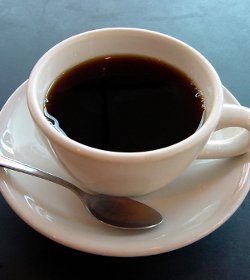Are you considering making a switch to either coffee or tea on account of your winning smile? Read on.
Coffee and tea stain your teeth
As a general rule, if a liquid can stain fabric, it can stain your teeth as well. What’s more, while the overall health benefits of tea are generally undisputed, there’s actually evidence to suggest it may ultimately stain your teeth more than a traditional cup of Joe.
If the above statement seems a bit counterintuitive allow us to explain.

Read more: How Can Gluten Impact Your Oral Health
Tea stains your teeth more than coffee
Despite the fact that your dark roast may appear to have more color than say, black tea, through naturally occurring tannins and processes such as oxidation, teas can really take to teeth, potentially leaving you stained or splotchy.
What is Tannin?
Tannins are found in all kinds of foods and beverages. For instance, you’ve probably heard this word most often used when talking about wine. In short, it’s an antioxidant called tannic acid, which is a naturally occurring vegetable dye. Tannins are quick to adhere to plaque on our teeth, and can ultimately cause yellowish discoloration on teeth’s surface.
In short, the more the tannins, the greater likelihood of stains.In the case of tea versus coffee, black tea has more staining power than green tea (same goes for dark black coffee as opposed to a lighter blend which has been diluted with cream or milk).
Read more: Does Dehydration Negatively Impact Your Oral Health
How to Remove Coffee and Tea Stains from Teeth
You don’t have to stop drinking tea if you don’t want your teeth to turn brown. Putting milk in your tea or drinking it through a straw can help, as can rinsing your mouth out with water or drinking water afterwards. Taking care of your teeth can help keep them from getting stained, but that isn’t always enough. There are many ways to improve the look of teeth that are stained by coffee:
- Whitening your teeth
- Keep a toothbrush and toothpaste at work so you can use them after your morning coffee.
- Baking soda can help whiten teeth even more if you brush with it twice a month.
- Swish a glass of water around your mouth after ingesting a cup of tea or coffee
- Brew light coffee and add a small amount of cream or milk
- Change out your black tea bags for green or white tea
- Floss daily
- Use baking soda and salt to lift surface stains
- Brush with whitening toothpaste immediately when you’re able to
How Else Coffee Affects Teeth
Coffee, like any other drink that isn’t water, can make bacteria grow in your mouth, which can wear down your teeth and enamel. This can make your teeth thin and easy to break.
Bad breath, or halitosis, can also be caused by coffee because it sticks to the tongue. To avoid these problems, eat something before you drink coffee and use a tongue scraper and toothbrush after you’re done.
Other Food and Drinks That Stain Teeth
Coffee isn’t the only thing that can stain your teeth. To keep your smile white, avoid foods and drinks that can make your teeth look yellow. A few of them include:
- Red wine
- Fruit Juice
- Sodas
- Soy Sauce
- Balsamic Vinegar
- Sports drinks
- Hard candy
Why Are Older People More Susceptible to Tooth Stains?
Dentin has a natural yellow hue, but as you age, the outer coating of enamel on your teeth will weaken and expose the dentin beneath it. Dentin is the core tissue of your teeth. Dentin will naturally yellow as it ages just like everything else. In addition, tooth discoloration can be caused by the consumption of beverages such as tea, coffee, wine, and dark-colored sodas over a period of years. Last but not least, the wear and tear that you subject your teeth to over the course of your life might result in a discoloration that only becomes apparent with increasing age.
Ultimately, we want to stress that, despite the potential for pesky stains, drinking tea is good for you. For example, Green tea contains the chemical compound fluoride which has been show to strengthen teeth substantially. It has been shown to kill bad breath causing bacteria and viruses in the mouth.
Can Stained Teeth be Cleaned?
Even teeth that are severely discolored can benefit from the expert cleaning services provided by a dentist. It is possible to improve the appearance of teeth by removing plaque and tartar with specialized instruments. This is especially helpful for removing yellow stains from teeth.
However, If you’re looking to get rid of your stained teeth, be sure to book an appointment with us to see if having your teeth bleached by a dentist is a good next step. We’ll look at your teeth and talk about options for whitening them, and we can help you make the decision that’s right for you.




